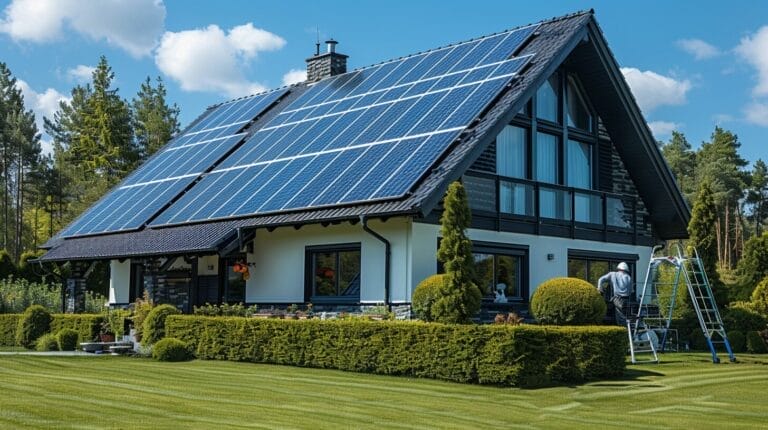Solar Panel for Water Heater: The Benefits of Solar Panels
Considering a switch to solar power for your water heating needs? Wondering about the benefits it could bring? Explore the advantages of installing solar panels for your water heater. From lower energy bills to reducing your carbon footprint, discover how this eco-friendly solution can benefit both your wallet and the environment. Experience the convenience and sustainability of solar energy while enjoying reliable hot water for your home in our Solar Panel for Water Heater guide.
Key Takeaways
- Harness renewable energy for water heating.
- Active and passive systems available.
- Reduce energy bills with long-term savings.
- Benefit from government incentives and rebates.
- Decrease carbon footprint and environmental impact.
Understanding Solar Panels and their Role in Water Heating Systems

Solar panels play a pivotal role in water heating systems, serving as the backbone of both active and passive solar water heating techniques. These panels allow homeowners to tap into the sun’s abundant thermal energy.
In an active solar water heating system, the panels convert the sun’s energy into heat, which is then transferred to water using a circulating pump. This process ensures a continuous supply of hot water for various household needs.
Passive solar water heating systems, on the other hand, absorb thermal energy without the need for electric controls. These systems follow the natural principle of heat rising to circulate hot water throughout the home.
Different Types of Solar Water Heaters for Your Home

Homeowners have a variety of options when it comes to solar water heaters, which can facilitate more informed decisions about sustainable home heating. These systems, ranging from passive to active solar energy systems, come in different types, each designed to efficiently heat your water.
Passive systems use natural circulation to heat water, providing a simple and cost-effective solution. In contrast, active solar water heaters use pumps to circulate water, offering more control over the heating process.
Compared to traditional water heating methods, solar water heaters are clean, renewable, and can reduce both carbon footprints and energy bills. Numerous case studies have highlighted the efficiency and long-term benefits of these solar energy systems.
The Installation Process of Solar Water Heaters

Understanding the installation process of solar water heaters, a key component of a solar energy system, is important for homeowners looking to harness solar power to heat the water in their home. Typically, the process involves mounting solar collectors on the roof to capture solar energy. These collectors absorb sunlight and convert it into heat, which is then transferred to the circulating water in the system. The collectors’ positioning is key to maximizing efficiency.
Installation requires tools and materials like mounting hardware, pipes, and insulation. Homeowners can choose between professional services for installation or a DIY approach. While professional installation comes with expertise and efficiency, DIY can offer cost savings. Regular maintenance is crucial for the system’s longevity and peak performance.
Evaluating the Efficiency and Cost-effectiveness of Solar Water Heaters

To evaluate the efficiency and cost-effectiveness of solar water heaters, it’s important to consider their long-term energy-saving benefits and compare their return on investment with traditional heaters. Solar water heaters can significantly reduce energy bills by using the sun’s power to heat water, offering a sustainable and environmentally friendly alternative.
When considering cost-effectiveness, remember to factor in government incentives and rebates that can lower the initial investment. Geographical location and climate can impact the efficiency of solar water heaters, with regions receiving more sunlight yielding higher energy savings.
Are Solar Panels for Water Heater and Residential Panels the Same?
Yes, solar panels for water heaters and residential panels are different. While both harness solar energy, water heater panels are designed specifically to heat water. For an affordable residential solar installation, it’s important to consult with a professional to determine the best panels for your specific needs.
Things to Consider Before Investing in a Solar Water Heater

Assessing your home’s suitability for a solar water heating system is crucial before investing in this eco-friendly technology. To guarantee you make an informed decision, here are some key factors to consider:
- Home Suitability: Evaluate if your home receives sufficient sunlight and has enough roof space for solar panels.
- Cost and Savings: Understand the initial investment cost, potential savings on energy bills, and available incentives or rebates.
- Sustainability: Assess the environmental impact of using solar water heaters in reducing carbon footprint.
- Durability: Take into account the lifespan and maintenance requirements of solar panels and water heating systems.
- Installation: Investigate the installation process, including any structural modifications needed for mounting solar panels.
Conclusion
To sum up, investing in a solar water heater can bring numerous benefits to your home.
Not only will you be reducing your carbon footprint and contributing to a cleaner environment, but you’ll also save money on your energy bills in the long run.
With various types of solar water heaters available and a simple installation process, it’s definitely worth considering this eco-friendly and cost-effective option for your water heating needs.
Frequently Asked Questions
What are the benefits of using a solar panel for water heating?
Using a solar panel for water heating can help you save money on your energy bills, reduce your carbon footprint, and contribute to a more sustainable future by utilizing clean energy sources.
How does a solar water heating system work?
A solar water heating system typically consists of solar panels that collect sunlight and convert it into thermal energy to heat water in your home’s water tank. The heated water can then be used for various purposes, such as showers or washing dishes.
What is the difference between passive and active solar water heating systems?
Passive solar water heating systems rely on natural processes like convection to circulate water through the system, while active solar water heating systems use pumps or other mechanical devices to move water through the system.
What are the factors to consider when installing a solar hot water system?
When installing a solar hot water system, you should consider the size of your household, your hot water usage patterns, the location and orientation of your home for optimal sunlight exposure, and any applicable government incentives like the federal solar tax credit.
How much hot water can a solar water heater provide?
The amount of hot water provided by a solar water heater, a vital part of any solar energy system, depends on factors such as the system’s size, efficiency, and the amount of sunlight available. However, a well-designed system can typically fulfill your daily domestic hot water needs.







